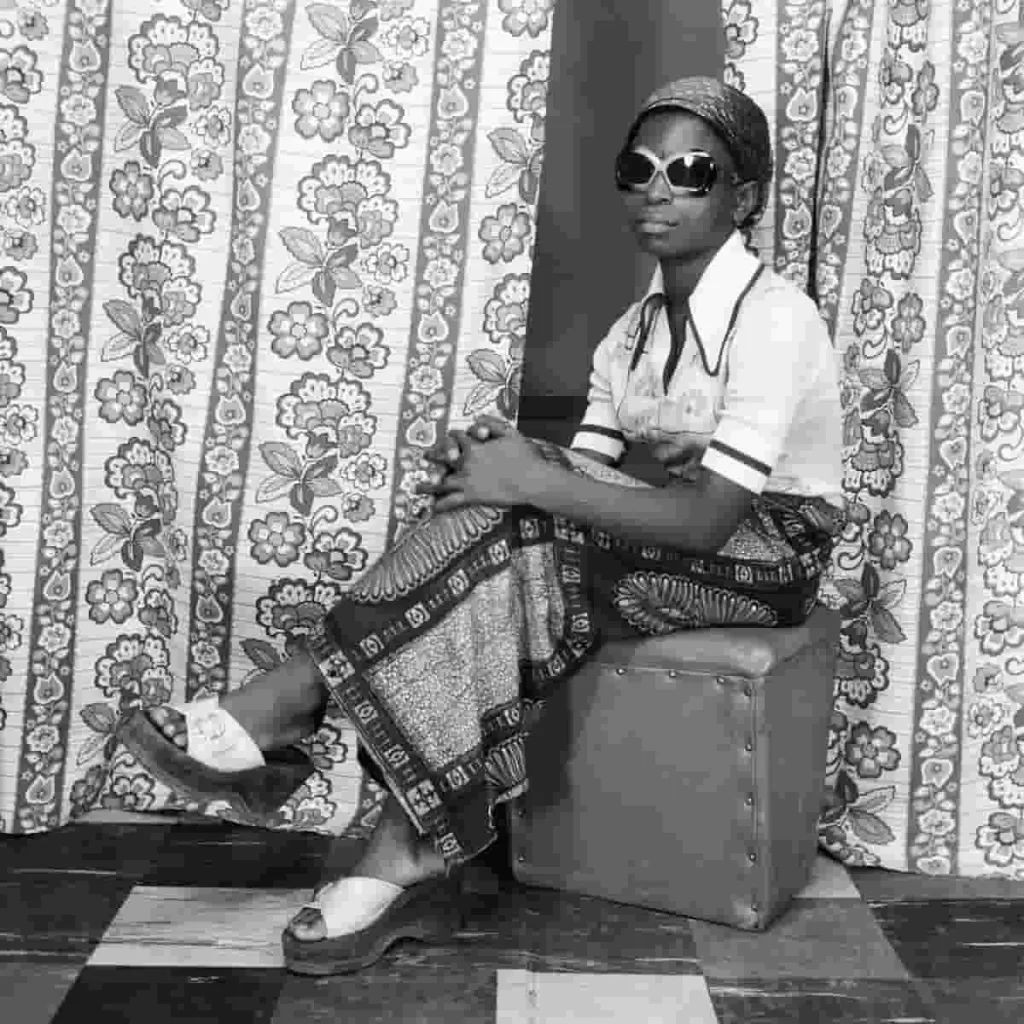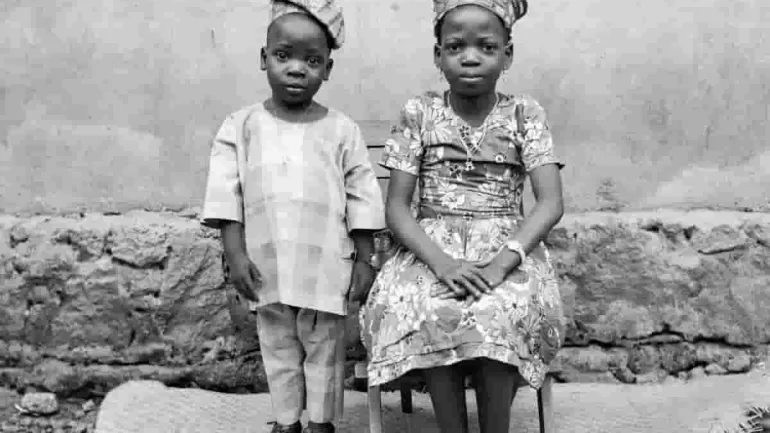ART PROJECTS
Two children dressed in traditional attire pose for a photograph at the Abi Morocco Photos studio on Aina Street, Shogunle, Lagos, c.1970s. Photo courtesy Lagos Studio Archives
Explore how Lagos Studio Archives is preserving Nigeria’s photographic heritage, highlighting iconic photographers, and documenting the nation’s cultural history.
BY KAZEEM ADELEKE, ARTCENTRON
Nigeria’s history is deeply intertwined with cultural expression, and photography has played an essential role in documenting and preserving the nation’s vibrant social and cultural fabric. From the colonial era to the present day, Nigerian photography has evolved, offering invaluable insights into the country’s diverse heritage and identity. A key initiative in this effort is the Lagos Studio Archives, a project that has the objective to safeguard this rich cultural legacy for future generations.
Lagos Studio Archives: Preserving Nigerian Photography
The Lagos Studio Archives project was launched in 2015 by Karl Ohiri and Riikka Kassinen. It plays an important role in rescuing and preserving the legacy of Nigerian portraiture. The project’s objective is to protect the invaluable photographic heritage captured in Lagos’s bustling photography studios. By focusing on both iconic and lesser-known photographers, the Lagos Studio Archives ensures that their work is not lost to time.
The Lagos Studio Archives collects, preserves, and digitizes thousands of film negatives and photographs. Starting from the 1970s to the present day, the project archives photographs for future protection. The collection offers a unique glimpse into the lives of ordinary Nigerians, providing an invaluable resource for understanding the social and cultural dynamics of the nation.
The Significance of Preserving Nigeria’s Photography Heritage
The preservation of Nigeria’s photographic history is of great importance. In a world where digital media is rapidly replacing traditional forms of media, the physical records of photography remain an irreplaceable cultural treasure. Therefore, initiatives like the Lagos Studio Archives are doing a major service to protect the legacy of Nigerian photographers. Safeguarding these materials is imperative for historical references. Future generations can access these visual records of the past.
In addition to preserving the rich history of Nigerian photography, Lagos Studio Archives is also making them available. As part of that initiative, the project recently organized a major photography exhibition. Abi Morroco Photos: Spirit of Lagos at the Autograph Gallery in England celebrates the works of Funmilayo and John Abe. The husband-and-wife photographers captured the spirit of Lagos in amazing black-and-white photographs. On the streets and in their studio, they immortalized the lifestyles and fashion sensibilities of Lagosians.
Since it opened, the Spirit of Lagos has brought greater recognition to John and Funmilayo Abe. There is an instant appreciation for their black-and-white portraits and the timeless insights into Nigeria’s cultural history. There is a spontaneous realization that these photographers are instrumental in shaping the nation’s visual storytelling traditions. It is not surprising that their work continues to resonate with audiences worldwide. Through the preservation efforts of the Lagos Studio Archives, these photographers are finally receiving the global recognition they deserve.
The Enduring Legacy of Nigerian Photography

With the Spirit of Lagos, Funmilayo and John Abe join the list of influential Nigerian photographers who documented Nigeria at the threshold of tradition and modernity. Like J.D. Ojeikere and Samuel Fosso, the Abes used their images to provide rich perspectives on Nigerian culture, identity, and history.
The Lagos Studio Archives preservation work must continue. This will ensure Nigeria’s photographic legacies continue to inform, inspire, and educate future generations. The project underscores the importance of visual storytelling in shaping the collective memory of a nation. It will remind many that the images captured by these Nigerian photographers are more than just pictures. That they are windows into the heart of the country.
The Role of Nigerian Photography in Global Cultural Dialogue
As Nigerian photographers gain increasing recognition on the global stage, there is a growing opportunity to share African stories through a new artistic lens. The pioneering work of photographers like Abi Morocco has opened the door for younger generations. It provides the opportunity to explore the rich narratives embedded in African culture, identity, and history. Through the medium of photography, these artists contribute to a broader, more nuanced understanding of the continent’s diverse landscapes and cultures.
The Lagos Studio Archives plays a key role in facilitating this cultural exchange. In addition to preserving the work of pioneering Nigerian photographers, it ensures that these stories reach a global audience. This endeavor enables photographers to continue using their art as a tool for cultural expression, social commentary, and social change.
Lagos Studio Archives: Expanding Beyond Boundaries
The future of Nigerian photography holds tremendous promise. As emerging photographers explore new styles and techniques, they are expanding the boundaries of Nigerian photography beyond regional borders. With the support of initiatives like the Lagos Studio Archives, the work of rising stars will bring Nigerian photography into the global spotlight.
Through the lens of a camera, these photographers continue to tell the evolving stories of Nigeria’s landscape, culture, and society. Photography, in this context, is a powerful tool for effecting social change. It offers a means of documenting and commenting on the shifting dynamics of Nigerian society. In preserving the legacy of earlier photographers, the Lagos Studio Archives establishes a solid foundation for Nigerian photography. More importantly, it ensures its cultural richness.
The Power of Photography in Shaping National Identity
The legacy of Nigerian photography remains indelible. Through the work of pioneers like Funmilayo and John Abe, this legacy stands as a testament to the power of visual storytelling. Their portraits captured more than just images; they immortalized the spirit of Lagos. Additionally, they document its cultural vibrancy, everyday life, and moments of deep emotion. Despite the rise of digital photography, efforts like the Lagos Studio Archives ensure the preservation of this invaluable photographic history.
The photographs preserved in the Lagos Studio Archives remain an enduring record of Nigerian identity, resilience, and beauty. They offer timeless insights into the past while serving as a bridge to the future of Nigerian photography. As we look ahead, this project will remain invaluable. It will ensure that the rich photographic heritage of Nigeria remains intact, offering a lasting legacy for future generations.
By integrating a comprehensive approach to preserving Nigerian photography, the Lagos Studio Archives safeguards cultural memory. More importantly, it creates opportunities for global recognition and dialogue. As the project grows, so too does the potential for Nigerian photography to shine on the global stage.
